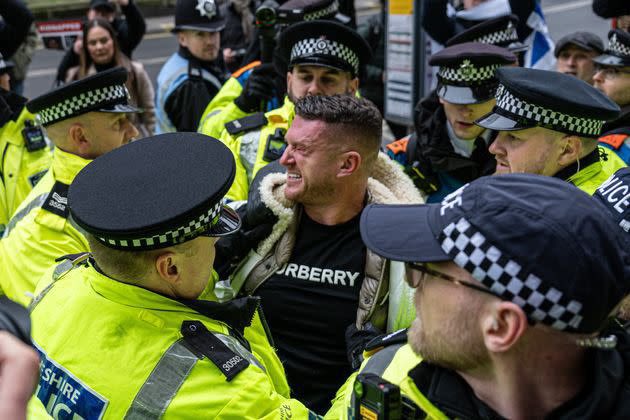
Guest post by Catherine Blaiklock, Founder of The Brexit Party

Tommy Robinson is being held in solitary confinement, in his own vast isolation block in the heart of Belmarsh Prison.
The great names of Islamic terrorism have all been inmates; the Manchester bombers, the 2005 London bombers, Abu Hamza and Anjem Choudary and an assortment of other mass murderers.
There were secular criminals Ronnie Biggs, the great train robbers spent time here, as did Thomas Mair who murdered Jo Cox.
Tommy Robinson is one of a tiny number civil prisoners are sent to Belmarsh.
He published a Facebook video of defendants entering a law court but as everyone knows, these were not ordinary defendants but part of a sequence of Muslim rape trials across the country. He was convicted of contempt of court.
We wait to get in among a crowd representative of every country in the world, intermixed with a lesser number of scruffy whites most of whom were British and working class. Suprisingly, given the large number of Muslim inmates, there was only one Muslim woman visitor.
Dressed in a full length, black abaya her face was entirely covered with just her eyes showing.
A regular she was friendly. She showed us the way to the first of the endless security points.
Her hands and fingers were covered in henna seen at Indian weddings but she was not Indian.
A disgruntled visitor next to me mumbled that they could not take her finger prints with all that ‘stuff’ on her fingers but who would protest in such an environment, even if true.
We arrive at a large room, somewhat like an airport security hall.
Small groups of about five people proceeded slowly through the complex.
Doors clanged shut behind us. As we slowly moved towards the heart of this vast camp doors opened in front of us. We were herded into spaces as tiny as a hotel lift.
We entered a series of rooms like lifts, entering by one set of sliding doors and exiting by another.
At each we all had to line up and place one index finger and then the other on a flashing screen.
Then we had to turn towards a camera for yet another photo, followed by our prison issued identity card being electronically checked.
This was repeated about ten times at each set of doors.
At one point, we arrive at a large room which looked like an airport security hall.
Rings, bangles and shoes came off, my mouth and ears checked.
While they poked and prodded my body and I was ordered to remove my cardigan to show my bra, the woman in the abaya behind me was not asked to undress.
Instead she momentarily pushed back her headdress so that they could check her ears.
Then the three of us who had come to see Britain’s No 1 political prisoner were separated from the other visitors, some of who seemed to be having fun as though it was a casual day out at a fun-fare.
Now it was quiet, deadly quiet. No more fun. Our own special warden arrived.
He was overly friendly. Was he a secret supporter? What did he think? I could not ask, nor could he answer, the walls in such a place have ears.
We entered a vast walled space the size of half a football pitch: High gates, razor wire, towering walls, clanging metal. An enormous, terrifying dog pulling at his stone-faced minder followed us in. All this just for one prisoner.
We are shown into Tommy’s visiting room – we did not see his cell; a tiny, dirty, plain room, shadowed by a thirty foot wall and overlooked by a single small sealed window, it smelt putrid and stale.
Then Tommy Robinson was brought in. It was a shock to see he was so short. He was tiny, almost unassuming.
The media portray him as a lionised, dangerous, radicalised figure but here was someone who just looked small, thin and tired. He was pale sporting a beard and a new haircut with a flouncy quiff that made him look like an unassuming English teacher.
Close up, I was sitting a foot away from him, it was his eyes that I noticed.
The girl with me said that they were ‘prison eyes’; the eyes of the worried, the isolated, the fearful. He never laughed and rarely smiled.
We had two hours. He started by describing his life of the last few months.
‘I have two hours a day out of my cell,’ he said. ‘That’s it. Even the Manchester bomber gets four or five hours.’
I asked what he did and how many staff guarded him. Two were on duty all of the time he was out of the cell and one when he was locked in his cell.
‘There is no one else here – no one. This entire block is empty apart from me. I have an exercise bike and books, a TV but no computer.’
He gestured to the horrible gloom below the high wall, ‘Look outside that window.’
‘That is the tiny space that I have to exercise in. I never see the sun and have to walk around and around like a caged animal.’
I asked about emails and letters. For a number of weeks he was not allowed any, then ,for some inexplicable reason, he was allowed to.
The letters all had to be opened and screened in case somebody had to filled an envelope with anthrax spores or explosive.
Each email was read and then printed out which meant that the number of emails he received was sometimes three feet tall. He read every single one.
He made a number of comparisons about the rights and exercise privileges afforded to Muslims who had murdered versus himself who had shot a facebook film.
I thought of the Muslim woman in the abaya who was not searched yet I was.
Tommy moved to his life in Luton; how it was when he grew up compared to now.
How everyone (he meant white British people) had moved out and the streets had become filled with people totally different from him.
He was pained and saddened by this but did not seem hate filled. He did not rant.
Did I warm to him? No. I warmed more our friendly prison guard – he was too reserved too distant, but it could have been him reacting to me and reacting to every word being recorded and his tiredness of his situation.
He was very worried about his life – about law suits, rape threats to his daughter, his wife, and his empty house.
He had built an house but could not live in it because of threats from gangs from two sides, both from Jihadis and from Antifa – although the later were cowards compared to the Jihadis.
An Antifa nutcase spent weeks trying to work out which safe house he was in by studying every house in a twenty-mile radius of Luton until he found where Tommy lived by the print on his curtains. Immediately the intimidation and threats began again.
Tommy and his family would never have a settled, safe, stable life in Britain. He would have to move abroad but he will never do that. He will fight to the bitter end.
I asked, ‘What do you want to do when you get out?’
‘I want to keep on making films, exposing what is going on. It is still going on.’
Some towns had only a very small number of Muslims, just a few percent but there were still terrible problems with grooming gangs.
He said if there are a thousand Muslim men between say 18 and 55 in a town, you will find five hundred of them are on lists of arrested people.
‘There was some girl getting raped. I knew who the two men doing it were. I will talk to anyone. I don’t care. I went over to their house to get them to stop. And if I can find out who is doing this stuff, why can’t the police and the authorities?’
‘In one case, this group had made a twelve year old girl pregnant. They took her to a field and ‘fixed’ her with a screwdriver up her vaginia.’
He suddenly slipped in, ‘All this has been good for me in one way.’
Maybe, I thought, he was working on the Trump basis, of all publicity is good publicity. Could he possibly have wanted to be arrested for the publicity and the fame? I did not know.
Did I think he was genuine ? Yes. Did I think he was worried about his future, family and being sued? Yes. Did I think he would get into trouble again ? Yes. Did I think he was a bit irresponsible? Yes.
He is not someone who thinks in accountancy or sensible terms. He is brave, a showman (even if a bit depressed at the time), a fighter for a cause he believes in. Seeing an existential threat to this country, he will keep on fighting even if it kills him.
Then the interview was over and he was led away, a small figure in a large place,. We left. It took us, one hour to get into the prison, three minutes, the Alsation still following us, to get out.
I thought of Kipling’s poem Tommy Atkins.
O it’s Tommy this, an’ Tommy that, an’ ” Tommy, go away ” ;
Tommy Robinson will not go away.
The post Political Prisoner No. 1 Belmarsh appeared first on The Gateway Pundit.






